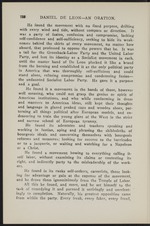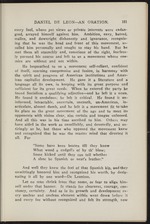| 1 |
 |
“...Socialist Labor Party
should become a real political party, not only a party of prop-
aganda. Several Sections, under the leadership of W Rosen-
berg and F. Bushe, editor of the Workmen-'s Advocate, the of-
ficial p^ty organ^-the American Section of New York among
em 00k the stand that the time had arrived for the Social-
ists to enter the political arena not here and there and at in-
definite periods, but to unfurl the banner of International So-
cialism on American soil without compromise or fusion with
any other political party. It was here that the New Yorker
Volkszeitung did its nefarious work by using its influence to
drive both Rosenberg and Bushe out of the party, and all
those who stood with them as well.
Rosenberg and Bushe thought they had the whole party
organization to back them up, and without doubt the majority
S infliL r"* But what wa a little
tene o organization to the Volkszeitung and its co-
movem t t the Socialist
movement, who were perhaps Socialists in their younger...”
|
|
| 2 |
 |
“...L. P. seemed to follow a path top narrow would stand up
for more tolerance, broadness, and fusion. Such was Char-
les Sotheran, wlho, being somewhat of a spellbinder, made a
little fuss for a while. Sotheran, however ridiculous this may
sound today, charged De Leon with wanting to establish tac-
tics a la Berlin in the American Socialist movement.
This was by no means a ridiculous charge then, for in
those days Wilhelm Liebknecht was at the helm of the Social
Democracy in Germany. Up to the year 1892 there were only
eleven Social Democrats in the Reichstag. In that year thirty-
six were elected. The Socialist Labor Party of America col-
lected $5,000 within six weeks for the 1892 election campaign
of the German Social Democracy. The party in Germany had
not then voted for war budgets and the Haases* and Scheide-
manns were not yet heard of.
Sotheran had very few to stand for his Populistic fusion
schemes, and he and his and the Socialist Labor Party parted
company.
The Homestead strike...”
|
|
| 3 |
 |
“...iency, seeking to hide its weak-
nesses behind the skirts of every movement, no matter how
absurd, that professed to oppose the powers that be. It was
a tail for the Greenback-Labor Party and the United Labor
Party, and lost its identity as a Socialist movement in each,
until the master hand of De Leon plucked it like a brand
from the burning and established it as the only political party
in America that was thoroughly self-sufficient and could
stand alone, refusing compromise and condemning fusion
the undaunted Socialist Labor Party. He gave it a purpose
and a goal.
He found it a movement in the hands of those, however
well meaning, who could not grasp the genius or spirit of
American institutions, and who while conforming in dress
and manners to American ideas, still kept their thoughts
and language in glazed peaked caps and wooden shoes, pat-
terning all things political after European models, and en-
deavoring to train the young giant of the West in the strict
and narrow school of European...”
|
|
| 4 |
 |
“...interests were endan-
gred, arrayed himself against him. Ambition, envy, hatred,
malice, and downright dishonesty and ignorance, recogniz-
ing that he was the head and front of this movement, as-
sailed him personally and sought to stay his hand. But he
met them all staunchly and, conscious of the right, fearless-
ly pursued his course and left to us a movement whose ene-
mies are without and not within.
He bequeathed to us a movement self-reliant, confident
of itself, scorning compromise and fusion, in harmony with
the spirit and progress of American institutions and Amer-
ican capitalist development. He gave it a literature and a
language all its own, in keeping with its great purpose and
sufficient for its great needs. When he entered the party he
found Socialism a qualifying adjectiveand he left it a noun.
He found it credulous: he left it critical. He found it un-
informed, intractable, uncertain, uncouth, un-American, in-
articulate, almost dumb, and he left it a movement fit to take...”
|
|
